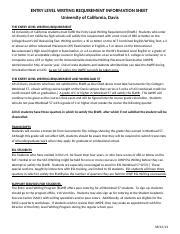Are you an aspiring writer looking to break into the industry with an entry-level role? This comprehensive guide will provide you with the essential knowledge and skills you need to craft compelling content that meets employers’ expectations.

Why Entry-Level Writing Requirements Matter
Employers in various industries actively seek entry-level writers to fill critical roles in content creation, marketing, and communications. These roles offer numerous opportunities for individuals to develop their writing abilities, gain valuable experience, and advance their careers.
According to the United States Bureau of Labor Statistics, the median annual salary for writers and authors is $67,120, while the top 10% earn over $124,520. With the growing demand for digital content, the job outlook for entry-level writers is expected to be positive, with a projected 9% growth in employment from 2020 to 2030.
Essential Skills for Entry-Level Writers
To succeed as an entry-level writer, you must possess a strong foundation in the following skills:
- Exceptional Writing Skills: Demonstrate clarity, conciseness, and a strong command of grammar, punctuation, and spelling.
- Storytelling Ability: Engage audiences with captivating narratives that convey information effectively and evoke emotions.
- Research and Analysis: Conduct thorough research, synthesize information, and draw meaningful conclusions.
- Digital Literacy: Proficient in using content management systems, social media platforms, and digital marketing tools.
- Communication Skills: Effectively communicate with clients, colleagues, and supervisors to gather requirements and convey feedback.
Crafting Compelling Entry-Level Writing Samples
When applying for entry-level writing positions, your writing samples play a crucial role in showcasing your abilities. Consider the following tips to create compelling samples:
- Tailor to the Role: Research the specific job posting and tailor your samples to the requirements.
- Demonstrate Skills: Highlight your storytelling, research, and communication skills through varied samples.
- Choose High-Quality Pieces: Select your strongest writing pieces that showcase your proficiency in different genres.
- Proofread Carefully: Ensure your samples are free of errors in grammar, punctuation, and spelling.
Common Entry-Level Writing Tasks
Entry-level writers are often responsible for a variety of writing tasks, including:
- Blog Posts: Create engaging and informative blog posts that educate, entertain, or promote a product/service.
- Articles: Write articles for magazines, newspapers, or websites that provide in-depth coverage of a specific topic.
- Social Media Content: Develop captivating social media posts, tweets, and captions that resonate with audiences.
- Email Marketing Campaigns: Compose persuasive email campaigns that drive engagement and conversions.
- Website Content: Write clear, user-friendly website content that enhances the user experience and supports business goals.
Where to Find Entry-Level Writing Jobs
Explore the following platforms to find entry-level writing jobs:
- Job Boards: Indeed, CareerBuilder, LinkedIn Jobs
- Company Websites: Visit the websites of companies in your target industries.
- Freelance Platforms: Upwork, Fiverr, Freelancer
- Networking Events: Attend industry events and connect with potential employers.
- Referrals: Reach out to your network for potential job openings.
Frequently Asked Questions
Q: What educational background is required for entry-level writing positions?
A: While a college degree is not always required, a bachelor’s degree in English, journalism, communications, or a related field is preferred by many employers.
Q: Can I gain experience as an entry-level writer without a degree?
A: Yes, it is possible to gain experience through freelance writing, internships, or starting a personal blog.
Q: How can I improve my writing skills for entry-level writing positions?
A: Practice regularly, read extensively, and seek feedback from experienced writers or mentors.
Q: What are the career advancement opportunities for entry-level writers?
A: With experience and dedication, entry-level writers can advance to roles such as senior writers, content managers, editors, and marketing executives.
Conclusion
Securing an entry-level writing position requires a solid foundation in writing skills, storytelling ability, and research and analysis. By crafting compelling writing samples, gaining experience through practice and freelance opportunities, and exploring various job platforms, you can successfully embark on a rewarding career in writing.
